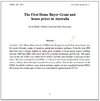- Joined
- 3 July 2009
- Posts
- 27,697
- Reactions
- 24,643
My apologies, if I added to your disappoint, the issue seemed to escalate due to people trying to put forward options, when that isn't what the other side wanted. The other side only wanted a forum to vent on, which is o.k, but it did go on and become a circular discussion.Well I think I’ve followed this forum enough now. I’ve got better things to do. I’ve added my 2 cents worth, which in short is, as a boomer I believe it’s more difficult to get on the housing ladder today than when I was a 20 year old.
Open discussion of opinions is good but this, for me, just seems to be an argument.
I’m off for a beer, but as a leaving comment, I pay tax, but I can’t vote, so what can I do ? I’m an immigrant.
I am sorry to see this good, interesting forum discussion on a really interesting and important topic being dragged in to one of insults and non bi partisan discussion.
Oh well moving on to see what the adults are discussing.
Gunnerguy
(sad and depressed that this interesting discussion has just gone downhill)
Again my apologies and hopefully you will stay with the forum as this style of discussion isn't usual.



